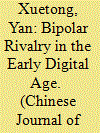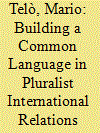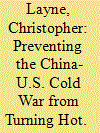|
|
|
Sort Order |
|
|
|
Items / Page
|
|
|
|
|
|
|
| Srl | Item |
| 1 |
ID:
175848


|
|
|
|
|
| Summary/Abstract |
The year 2019 saw the curtain rise on a US–China bipolar rivalry quite different from the Cold War US–Soviet bipolarity. The fundamental difference between the current bipolar rivalry and that during the Cold War is that ideology is no longer the main engine driving international competition, but rather the new digital dimension of strategic competition that is emerging between the United States and China. Technological advancement over the past 15 years has led world history’s entry into the early digital age. The development of digital technology has created new ways of protecting national security, of accumulating national wealth, and of obtaining international support. Cybersecurity is becoming the core of national security and the share of digital economy in major powers’ gross domestic product dramatically increases. For the leading powers, strategic competition in cyberspace in this early digital age outstrips to a crucial extent that within physical geographic boundaries. This article observes that Cold War mentality and digital mentality will have mixed impact on foreign policy-making in the digital age, and that interactions between the nations whose foreign policy is simultaneously influenced by both mentalities will shape the emerging international order into one of uneasy peace, where there is no direct war and few proxy wars. It will rather be a scenario reflecting the dark side of globalization and downside of global governance, evident in the violation of agreements, double dealing, cyber-attacks, and technology decoupling between states. Although further digital advancement will indeed change international politics in ever more aspects, US–China bipolar configuration will nevertheless remain in place for at least for two decades, or perhaps longer.
|
|
|
|
|
|
|
|
|
|
|
|
|
|
|
|
| 2 |
ID:
175852


|
|
|
|
|
| Summary/Abstract |
This article aims to contribute to the gradual building of a common scientific language within the world International Relations (IR) epistemic community. The author shares the objective, indicated by many leading Chinese scholars, of a pluralist IR theory that goes beyond Western-centric mainstream theories to provide a European continental perspective. Such a perspective takes stock, on the one hand, of the legacy of Gramsci, Bobbio, and Habermas, and, on the other, of the theoretical implications of European unity as a sophisticated instance of regional cooperation. Since the dialogue must be at the highest possible theoretical level, the author selects as main partners two leading theories from the increasingly rich and internally various Chinese IR scholarship: the books recently published in English by Qin Yaqing and Yan Xuetong, who represent—not only in China, but at world level—two fundamental references in the international theoretical debate. They lead two innovative approaches: Qin’s relational theory and Yan’s theory of moral realism. The author discusses their main theses and concepts regarding IRT and global governance in a free, open, and dialectic way, notably, the balance between background cultures and multilateral convergence; and the differences between the crucial concepts of hegemony, domination, and leadership, as well as alternative perspectives on global governance within a multipolar world—a new post-hegemonic multilateralism? Or a bipolar global power structure competing for leadership?
|
|
|
|
|
|
|
|
|
|
|
|
|
|
|
|
| 3 |
ID:
175851


|
|
|
|
|
| Summary/Abstract |
Constructing a credible foreign threat is a key activity in the US national security community. By adopting a narrative approach to threat formation, we attempt to delineate the contours of the Soviet Union, Japan, and China in the US threat discourse spectrum. The Soviet threat is constructed through a story of two ideologically opposed rivals competing for world domination and the Japan-bashing narrative is of victimisation due to Japan’s unfair competition. China threat stories, however, are now more complex, conflating a story of US victimhood at the hands of China’s unfair competition, advocated by President Trump, with a widely embedded but malleable epic tale of power competition between a rising power and the ruling power, and a new Cold War script propagated by the 'deep state' hawks. We have found that as long as a country may potentially threaten the United States’ hegemonic identity, be it a formidable power with an antagonistic outlook like the Soviet Union, an ally from inside like Japan, or a rising peer competitor like China, the United States will invariably construct a diametrical self-other story in a zero-sum mindset and resort relentlessly to its superior Self while customising its threat story scripts in accordance with the rival’s characteristics and dimensions of challenges.
|
|
|
|
|
|
|
|
|
|
|
|
|
|
|
|
| 4 |
ID:
175849


|
|
|
|
|
| Summary/Abstract |
During the Trump administration, Sino-American relations have deteriorated to the point where the new consensus in the U.S. foreign policy establishment is that a new Cold War has begun between the U.S. and China. This article looks at the origins of the “first Cold War” for insight into how a second Cold War might be avoided. There is a danger of the Cold War turning hot because of power transition dynamics. This article also invokes the pre-1914 Anglo-German rivalry, and argues that if conflict is to be avoided, the U.S. must accommodate China's rise by yielding hegemony in East Asia and meeting China's status claim.
|
|
|
|
|
|
|
|
|
|
|
|
|
|
|
|
| 5 |
ID:
175850


|
|
|
|
|
| Summary/Abstract |
How do various temporal dynamics affect international politics? Time has been gaining more attention in recent years in the literature on politics, generally, and international relations, more specifically, but no effort has been made systematically to apply these insights to the case of power transitions. This article explores how four different factors—time horizons, timing, sequencing, and trajectories—influence the way that states behave, specifically in the context of power transitions. Each of these dynamics contributes to a richer understanding of the nature of great power cooperation and competition. For each of these four dynamics, the article lays out the logic of what each uniquely adds to the existing literature on power transitions and then demonstrates the logic by drawing on the historical record of power transitions. Then, the article examines a variety of factors at the individual, state, and systemic level that might influence how each of these temporal dynamics unfolds. Throughout, the article comments on implications of the argument for contemporary relations between the United States and China.
|
|
|
|
|
|
|
|
|
|
|
|
|
|
|
|
|
|
|
|
|